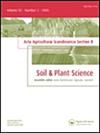蚕豆寄主状态及寄主敏感性研究
IF 1.8
4区 农林科学
Q2 AGRONOMY
Acta Agriculturae Scandinavica Section B-Soil and Plant Science
Pub Date : 2023-04-20
DOI:10.1080/09064710.2023.2195866
引用次数: 0
摘要
本文章由计算机程序翻译,如有差异,请以英文原文为准。
Host status and host sensitivity of Kickapoo white tepary bean to Meloidogyne entorolobii
ABSTRACT Tepary bean (Phaseolus acutifolius A. Gray) is a drought tolerant leguminous crop and due to its multi-purpose use, it can easily be incorporated into different production systems. It being an undertilised crop, its production is usually relegated to poor sandy soils that are highly prone to root-knot nematodes (Meloidogyne species). Commonly communal producers of tepary beans use retained seeds with no knowledge of the nematode resistance status of the seeds. Hence the objective of the study was to determine whether Meloidogyne enterolobii will be able to reproduce on the Kickapoo white tepary bean and cause a reduction in the plant's growth variables. To achieve this objective, Kickapoo white tepary bean seedlings were exposed to 0, 25, 50, 125, 250, 625, 1250 and 3125 M. enterolobii eggs and second-stage juveniles (J2) in 2021 and validated in 2022 under shade-net conditions. At 56 days after inoculation, plant and nematode variables were collected and reproductive factor (Rf) was computed. Plant growth variables were not reduced whereas, nematode variables increased with an increase in nematode levels. In both experiments the Rf values were above a unity for all inoculation levels, indicating that nematodes were able to reproduce.. In conclusion, Kickapoo white tepary bean is tolerant to M. enterolobii.
求助全文
通过发布文献求助,成功后即可免费获取论文全文。
去求助
来源期刊
CiteScore
4.40
自引率
0.00%
发文量
56
审稿时长
2.3 months
期刊介绍:
Acta Agriculturæ Scandinavica Section B publishes original research in applied soil and plant science with special attention given to to crop production in agri- and horticultural systems. We welcome manuscripts dealing with:
Climate smart and sustainable crop production systems
Water and nutrient efficiency
Soil conservation and productivity
Precise agriculture systems
Applications of bio- and nanotechnology
Digitalisation and robotics
Soil-plant interactions
Acta Agriculturæ Scandinavica, Section B – Soil & Plant Science forms part of a series of titles published on behalf of the Nordic Association of Agricultural Science (NJF). The series also includes Section A - Animal Science .

 求助内容:
求助内容: 应助结果提醒方式:
应助结果提醒方式:


